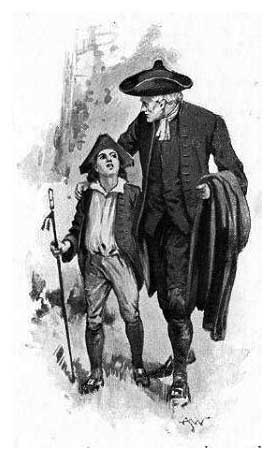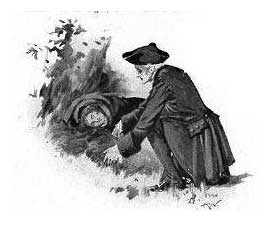Chapter 2 | A Young Hero
The patch of woodland in which Dr Martin and his pupil were hiding was not large, and before long they had reached the farther side and stopped short to crouch down among the bushes, fearing to go out in the open country.
“They’d see us directly,” said Phil. “There’s another shot. I say, doesn’t that show the soldiers haven’t been able to hit my father?”
“Of course,” said the Doctor, cheerfully; and then after listening while the firing kept on, sounding more and more distant till it stopped altogether, he held his breath in dread lest the boy should notice this and ask him whether the silence might mean that the French soldiers had at last hit either man or horse. But to the old man’s great relief Phil took the silence to mean that the Captain had escaped, and was in a high state of excitement and showed his delight.
“They’ll come after us now,” he said, “but I don’t care now father has got away.”
“Then you wouldn’t mind being taken a prisoner, Phil?” said the Doctor.
“Oh, yes, I should. It would be dreadful for you.”
“And for you, my boy.”
“Oh, I don’t think I should mind much, Dr Martin. It would be good fun too.”
“Good fun?”
“Yes,” said the boy, with a merry grin upon his frank young face. “We should have no books, and there’d be no lessons.”
“I could teach you without books, Phil,” said the Doctor, gravely.
“Yes, I forgot that,” said the boy. “Oh, what a lot you know!”
“Very little, my dear boy; but we cannot think about lessons now—we have to escape. We must not let the soldiers take us.”
“Of course not; but, I say, Dr Martin, I don’t think I understand it a bit. Why are the French and English going to fight?”
“I’m afraid it is because they consider themselves natural enemies, my boy. Your people have a great part of North America and my people have Canada. War has been declared, and King George’s soldiers have come to take Canada from the French King.”
“And that means fighting, of course,” said Phil. “My father has come with his men to fight against the Marquis—Marquis— What did you say his name is?”
“Montcalm. The Marquis de Montcalm,” replied the Doctor, “who is at Quebec.”
“And my father’s men are going to take Quebec away from him for the King of England.”
“Your father’s leader is General Wolfe,” said the Doctor, smiling.
“Oh, yes, I know—General Wolfe,” said Phil, eagerly. “But, I say, Dr Martin, shan’t we be able to go back to the house—I’m getting so hungry?”
“No; I’m afraid we must not go back to the house again.”
“But all our things are there.”
“Yes, all our clothes, and my books.”
“But what about dinner?” cried Phil.
“Ah, to be sure,” said the old man, smiling, “what about dinner! You see, Phil,” he continued, as he looked about in all directions over the open country, “your father said we were to get right away from the fighting, and after it was over he would come and join us.”
“Yes, I know,” said the boy.
“Well, we should have had to start to-night, or to-morrow, so it only means that we have come away in a hurry and meet him all the sooner.”
“To be sure,” said the boy, eagerly.
“You won’t mind going without your dinner?”
“Of course not,” cried Phil, stoutly.
“And if we have to sleep in a barn or shed somewhere to-night instead of a comfortable bed, you won’t mind that either, will you?”
“Not a bit,” cried Phil. “Let’s sleep in the forest, and cut down boughs and pick leaves for a bed. It would be fun. I should like it.”
“To be sure you would.”
“Wouldn’t you, Dr Martin?”
“That I should, my boy,” cried the Doctor, who was still eagerly searching the fields and meadows broken up by patches of forest. “Look here, Phil; we want to get away, as your father wishes, from all this terrible war, so we’ll put all lessons aside and think of nothing but making this a holiday excursion amongst the fields and woods; and when we get tired we’ll sit down on a tree trunk and rest, and if the sun is too hot we will have a nap in the shade. Sometimes we shall be thirsty.”
“And then we’ll lie down on the bank of a river and drink,” cried Phil, clapping his hands.
“To be sure—drink the beautiful clear water. We can sleep, too, in the fir woods. The soft fir needles make a beautiful aromatic bed.”
“What’s aromatic?” said Phil, with his eyes sparkling.
“Sweet-scented and spicy.”
“I shall like that,” cried the boy; “only won’t the fir needles prick when we undress?”
“But we shan’t undress, my boy.”
“What fun! Father will laugh when I tell him by and by. But you don’t say a word about what we are to eat, Dr Martin?”
“Oh, we shall find something to eat. Why, we might catch some fish perhaps in the streams.”
“Yes,” cried Phil, excitedly.
“And make a fire and bake them in the hot ashes.”
“To be sure,” cried Phil, clapping his hands again.
“Sometimes, too, we may be able to dig up a few potatoes.”
“And roast them.”
“Of course. You’ll like making a fire.”
“I shall,” cried the boy, with emphasis.
“Then we can call at a farm sometimes and buy some bread and milk and—”

“I say, Dr Martin, this is going to be a holiday. Which way are we going?”
“Straight away yonder, my boy—south, towards the British possessions.”
“Make haste then. Take hold of my hand and let’s run like father calls double. Let’s get to that river we drove to in the car months ago.”
“Yes, we might go that way,” said the Doctor, thoughtfully. “But why did you choose that route?”
“Because I want to catch some fish for dinner.”
“Without hook or line?”
“I shall go into the shallow, where we can see them, and splash them out with my hands.”
“To be sure, or perhaps spear one with a long, sharp stick.”
“Yes, I’ll try that. Oh, do let’s go on at once. I want to begin.”
“Very well,” said the Doctor, after a long, anxious look round. “You go first, and I’ll follow.”
“Let’s walk fast,” said Phil.
“Yes, let’s walk fast,” replied the Doctor.
And they started off along by the wood side, then by hedges and ditches, and on and on, keeping to the open country and avoiding every farm, Phil trudging away manfully, while whenever he showed his weariness, the Doctor picked out some beautiful flowery prairie, or the side of a pine wood, that they might rest.
But the way was rough and long, and when Phil’s enthusiasm had lasted till far in the afternoon, the sun seemed to beat down hot, and the poor boy’s feet dragged heavily, while much talking had made the Doctor’s voice sound husky, and a great thirst troubled both.
“Getting tired, Phil?”
The little fellow turned—his weary, troubled eyes towards his questioner, and was about to say, “Oh, so tired and so hungry!” But he forced himself to say:
“Yes, just a little.”
“Ah, and so am I,” said the old man, cheerily; “but look yonder!”
“Soldiers!” cried Phil, excitedly.
“No, no, no, my boy; we are free and safe, and out in the open country. I mean, look at that dark fir wood yonder, and the gleam of sunshine on water! Let’s get there and rest and bathe our feet; and then what do you say to a nap?”
“Shall we find the fish and make the fire, Dr Martin?” said the boy, anxiously.
“I hope so,” was the reply. “Let’s try. Come along. Hang on to my hand; or, look here, Phil, what do you say to a pig-a-back?”
“Yes,” cried the little fellow, holding out his hands eagerly. “No, I won’t. I’m not quite tired, and I’m getting so heavy now. It isn’t far, is it?”
“Not very,” said the Doctor, rather faintly, and they trudged on and reached a little stream, which cut its way through the sandy land just at the very edge of a pine wood, to sink at once upon the bank.
There were no fish visible, but the clear water was delicious, and they drank long and deeply, before bathing their weary and sore feet.
“What fun!” cried Phil, reviving a little as he buried his feet in the soft, warm, dry sand and let it trickle between his toes.
But a cloud came over his face directly after, for it was many hours since anything had passed his lips. There was abundance of dead wood low down about the trunks of the fir-trees, but no flint and steel or tinder-box to obtain fire, and the evening was very near.
The Doctor looked far and near, but no farmhouse or settlement was in sight, and when after a long rest he proposed that they should make a fresh start and Phil replaced his socks and shoes, he limped when he stood up, and in spite of a brave effort the tears would come to his eyes.
“Let’s rest a little longer,” said the Doctor, tenderly, and he led the way a short distance into what proved to be a vast pine forest, where the needles that had fallen for ages lay in a thick dry bed. “Let’s try here,” he said, as he raked a hollow beneath the great far-spreading boughs, which were thick enough to form a shelter from any wind or rain that might come.

“Lie down, my boy,” said the old man, gently, and the little fellow glanced at him piteously and obeyed.
“Oh, don’t look at me so reproachfully, my child,” sighed the Doctor to himself, as the weary boy’s eyes looked large and dark in the shade; but only for a few moments before they grew dull, and then the lids fell and he was sleeping so soundly that he did not stir when the Doctor raked the soft sweet-scented pine needles round him till he lay as if it were in a nest.
And only a few minutes after the Doctor had sunk lower and lower, drooping over his charge to keep watch, but only to leave that to the great bright stars which came out one by one, peering down among the pine boughs at the dark spot where the travellers, old and young, were sleeping soundly.

